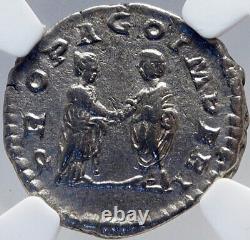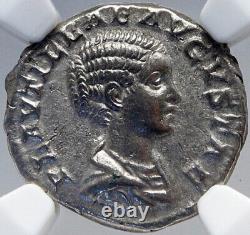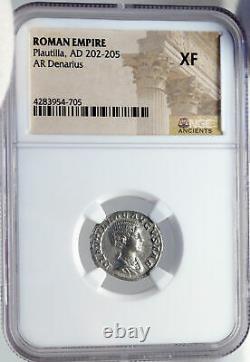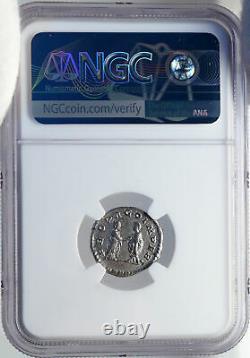
- Homepage
- Composition
- Denomination
- Ae Prutah (34)
- Ae3 (14)
- Antoninianus (104)
- Ar Denarius (42)
- Aurelianianus (12)
- Aureus (145)
- Bi Double Denarius (24)
- Bi Nummus (22)
- Centenionalis (16)
- Cistophorus (24)
- Denarius (1271)
- Double Denarius (63)
- Dupondius (16)
- Nummus (119)
- Prutah (27)
- Quadrigatus (13)
- Sestertius (127)
- Siliqua (15)
- Solidus (169)
- Tetradrachm (21)
- Other (604)
- Era
- Grade
- Ruler
- Antoninus Pius (53)
- Augustus (141)
- Caracalla (53)
- Constantine I (57)
- Constantine Ii (29)
- Domitian (58)
- Gallienus (37)
- Gordian Iii (62)
- Hadrian (100)
- Marcus Aurelius (69)
- Nero (113)
- Nerva (31)
- Philip I (66)
- Septimius Severus (35)
- Severus Alexander (69)
- Theodosius Ii (32)
- Tiberius (69)
- Trajan (97)
- Trajan Decius (28)
- Vespasian (76)
- Other (1607)
- Year
PLAUTILLA & CARACALLA Marriage Silver 202AD Ancient Rome Roman Coin NGC i82904






Item: i82904 Authentic Ancient Coin of. Silver Denarius 18mm Rome mint, struck 202 A. Reference: RIC IV 362; RSC 21; sear5 #7073 Certification: NGC Ancients.
XF 4283954-705 PLAVTILLAE AVGVSTAE, draped bust right PROPAGO IMPERI, Plautilla and Caracalla clasping hands. Marriage in ancient Rome was a strictly monogamous institution: a Roman citizen by law could have only one spouse at a time. The practice of monogamy distinguished the Greeks and Romans from other ancient civilizations, in which elite males typically had multiple wives. Greco-Roman monogamy may have arisen from the egalitarianism of the democratic and republican political systems of the city-states. It is one aspect of ancient Roman culture that was embraced by early Christianity, which in turn perpetuated it as an ideal in later Western culture. Marriage had mythical precedents, starting with the abduction of the Sabine Women, which may reflect the archaic custom of bride abduction.Romulus and his band of male immigrants were rejected conubium, the legal right to intermarriage, from the Sabines. According to Livy, Romulus and his men abducted the Sabine maidens, but promised them an honorable marriage, in which they would enjoy the benefits of property, citizenship, and children. These three benefits seem to define the purpose of marriage in ancient Rome. The word matrimonium, the root for the English word "matrimony, " defines the institution's main function. Involving the mater (mother), it carries with it the implication of the man taking a woman in marriage to have children.
It is the idea conventionally shared by Romans as to the purpose of marriage, which would be to produce legitimate children; citizens producing new citizens. Consortium is a word used for the sharing of property, usually used in a technical sense for the property held by heirs, but could also be used in the context of marriage. Such usage was commonly seen in Christian writings. However, the sharing of water and fire (aquae et ignis communiciatio) was symbolically more important. It refers to the sharing of natural resources.Worldly possessions transferred automatically from the wife to the husband in archaic times, whereas the classical marriage kept the wife's property separate. In order for the union of a man and woman to be legitimate, there needed to be consent legally and morally. Both parties had to be willing and intend to marry, and both needed their fathers' consent.
If all other legal conditions were met, a marriage was made. Roman couple joining hands; the bride's belt may show the knot symbolizing that the husband was "belted and bound" to her, which he was to untie in their bed.
Publia Fulvia Plautilla, Fulvia Plautilla or Plautilla c. 185/around 188/189 - early 212 was the only wife of the Roman emperor Caracalla, who was her paternal second cousin. After her father was condemned for treason, she was exiled and eventually killed on Caracalla's orders. Plautilla was born and raised in Rome.
She belonged to the gens Fulvia of ancient Rome. The Fulvius family was of plebeian origin, came from Tusculum, Italy and had been active in politics since the Roman Republic. Her mother was named Hortensia; her father was Gaius Fulvius Plautianus; the Commander of the Praetorian Guard, consul, maternal first cousin and close ally to Roman Emperor Lucius Septimius Severus (the father of Caracalla). She also had a brother, Gaius Fulvius Plautius Hortensianus. Severus and Plautianus arranged for Plautilla and Caracalla to be married in a lavish ceremony in April 202. The forced marriage proved to be very unhappy; Caracalla despised her. According to Cassius Dio, Plautilla had a profligate character. According to numismatic evidence, Plautilla bore Caracalla a daughter whose name is unknown in 204. In the same year, her father-in-law ordered the erection of the Arch of Septimius Severus, honoring himself and his family, including his wife, Empress Julia Domna, Caracalla, Plautilla and her brother-in-law Publius Septimius Geta. On January 22, 205 Gaius Fulvius Plautianus was executed for treachery and his family properties were confiscated.Plautilla and her daughter were exiled by Caracalla to Sicily and then to Lipari. They were treated very harshly and were eventually strangled on Caracalla's orders after the death of Septimius Severus on February 4, 211. Coins bearing her image that have survived are mainly from the reign of her father-in-law. They are inscribed Plautilla Augusta or Plautillae Augustae.
A marble bust of Fulvia Plautilla is in the Louvre. The Solinjanka or Salonitanka, meaning "woman from the city of Solin (ancient Salona)", is one of the most important Roman portraits found in Croatia, believed to depict Plautilla at a young age. Originally found in Salona, it is now kept in the Archaeological museum in Zagreb. World-renowned expert numismatist, enthusiast, author and dealer in authentic ancient Greek, ancient Roman, ancient Byzantine, world coins & more. Ilya Zlobin is an independent individual who has a passion for coin collecting, research and understanding the importance of the historical context and significance all coins and objects represent.
Send me a message about this and I can update your invoice should you want this method. Getting your order to you, quickly and securely is a top priority and is taken seriously here. Great care is taken in packaging and mailing every item securely and quickly. What is a certificate of authenticity and what guarantees do you give that the item is authentic? You will be very happy with what you get with the COA; a professional presentation of the coin, with all of the relevant information and a picture of the coin you saw in the listing. Additionally, the coin is inside it's own protective coin flip (holder), with a 2x2 inch description of the coin matching the individual number on the COA. Whether your goal is to collect or give the item as a gift, coins presented like this could be more prized and valued higher than items that were not given such care and attention to. When should I leave feedback? Please don't leave any negative feedbacks, as it happens sometimes that people rush to leave feedback before letting sufficient time for their order to arrive. The matter of fact is that any issues can be resolved, as reputation is most important to me. My goal is to provide superior products and quality of service. How and where do I learn more about collecting ancient coins? Visit the "Guide on How to Use My Store".For on an overview about using my store, with additional information and links to all other parts of my store which may include educational information on topics you are looking for. This item is in the category "Coins & Paper Money\Coins: Ancient\Roman: Imperial (27 BC-476 AD)".
The seller is "highrating_lowprice" and is located in this country: US. This item can be shipped worldwide.- Material: Silver
- Ancient Coins: Roman Coins
- Certification Number: 4283954-705
- Certification: NGC
- Grade: XF
- Composition: Silver
- Ruler: Plautilla
- Denomination: Denarius
- Year: Year_in_description

